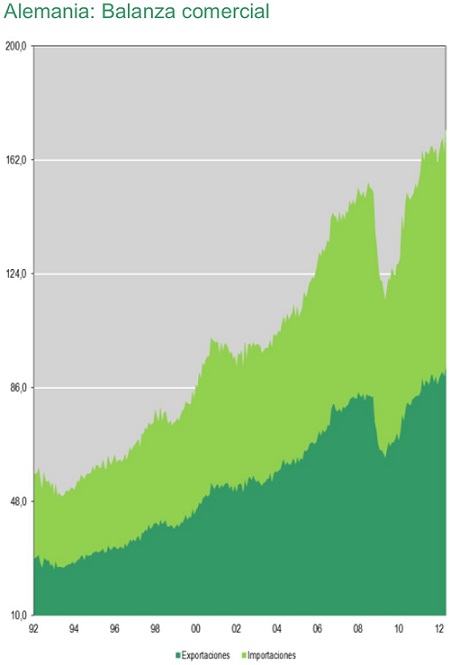LONDON | Germany's imports have kept growing year on year at a moderate pace, with a 2.9 percent increase recorded in May. So have its exports, too. The latest data confirm the German economy as the healthiest core of the euro zone, with an accumulated trade surplus of €73.8 billion in that month, up from the €62.9-billion surplus in the same period of time in 2011. Export activity, indeed, has improved by 0.1 percent against almost all euro and global economic odds.
Analysts at BNP Paribas in Madrid said Tuesday they expect Germany's trade balance to do well during the rest of the year. In London, in a comment to clients, Chris Towner, director at currency exchange brokers HiFX, hinted at the high probability that a weaker European common currency could have helped:
“The euro, although trading at the 2-year low, certainly looks stable and let's not forget that Germany has been handed the competitive edge again via a weaker currency. All we need now is a boost to global growth and Europe looks set to grow again. Mind you, growth seems a bigger word nowadays than pre crisis.”
So how bright things look in Berlin? From a selfish viewpoint, the answer is much better than everywhere else in the European Monetary Union. And perha
ps further out.
The Sentix investor confidence euro survey in July is at -29.6 versus previous -28.9, and the extension of tax reductions in the US on families earning less than $250,000 per year, suggested by the White House on Monday, spells trouble. The Chinese trade balance in June was described, too, as proof of a slower economic performance than it had been hoped for, due to a somehow faltering imports activity. The push global growth would need in the second half of the year seems unlikely.
The measures that allow us to feel the pulse of the world's economy often result in contradictory conclusions in a certain moment, but the story they tell has been easy to follow so far: no country should believe it can isolate its economy from the dramas unfolding at its doors. It might be unfair, but Germany's economic strength comes accompanied by the responsibility of determining to put an end to the current vacuum of proper integration of the euro area. The time is now, when its engines still roar.





